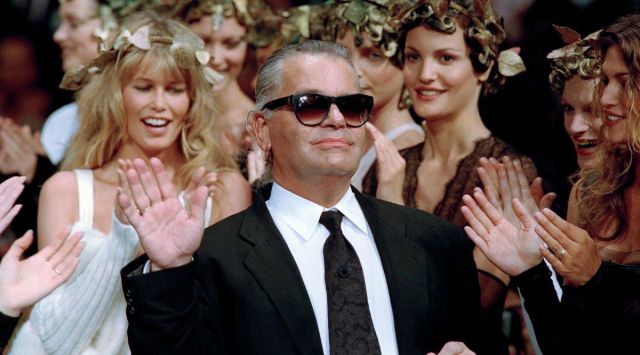
It is difficult to know if the legendary Karl Lagerfeld, the fashion guru who stitched tradition with his creativity to create a spectacular present, would have turned democratic enough to absorb the diversity of the world around him and remould himself instead. After all, he did believe in respecting innovation, evolution and technology — the key qualifiers for a modern world. But that’s the problem with a posthumous tribute — you continue to see the man through his last recorded moment and would not know if he would have evolved or not. Perhaps that’s why the Met Gala’s theme this year has found itself on the wrong side of popular discourse. Its tagline, “Karl Lagerfeld: A Line of Beauty,” suddenly doesn’t seem so beautiful as critics wonder whether an all-embracing global event should celebrate a man who did not embrace inclusivity and had pigeonholed himself with his White supremacist rants.
Of course, you cannot ignore Lagerfeld’s talent — he embodied the design philosophy of Fendi for 50 years, rescued and rebranded Chanel and ran it for 30 years and even set up his own label, building a unique persona for each label. Lagerfeld was both prolific and focussed. That’s why he continues to be an inspiration for generations of designers. Strictly in terms of fashion, one cannot deny the Met the right to iconise him. But the Met Gala is no longer an insular industry event. It may have begun in 1948 as fashion publicist Eleanor Lambert’s efforts to fund the newly-founded Costume Institute at the New York Metropolitan Museum of Art. But since 1995, its key organiser, editor-in- chief of Vogue Anna Wintour, has elevated it into a celebration of contemporary elegance and a meeting of minds from the performing arts — films, television, music and theatre — as well as business, politics and sports. A high table at the Met is an all-access pass to global citizenship and acceptance. Just sample this year’s line-up of celebrities who will co-chair the event with Wintour — Albanian-English singer Dua Lipa, Spanish actor Penélope Cruz, Ghanaian-British screenwriter and actor Michaela Coel and tennis great Roger Federer.
It is this inclusivity that is at odds with Lagerfeld’s stated positions. Strangely, he wasn’t insular when it came to his work, representing every colour and catering to every age group, particularly the young (he actually called this categorisation a worse form of “racism”). People in the know often talk of his deep knowledge and his mile-long library. If anything, he actually democratised fashion, particularly at Chanel, playing with textures, structure and grammar and even drawing inspiration from city subcultures. But he harboured biases that may not have looked odd in the more rigid echelons of society. And he was crude in how he expressed some of them, coming across as fat-shaming, homophobic, misogynistic and racist. “You cannot kill millions of Jews and then take in millions of their worst enemies afterwards, even if there are decades [between the two events],” he said of Germany taking in Muslim immigrants. “If you don’t want your pants pulled about, don’t become a model! Join a nunnery,” he said, in response to a model’s complaint about being sexually harassed by a stylist. He called women critics “fat” mothers who found thin models “ugly”, and openly advocated the use of fur, saying it was an industry that gave jobs. He thought gay men couldn’t make good parents because they were not naturally oriented towards it.
That’s why British actor and activist Jameela Jamil questioned the celebration of Lagerfeld’s legacy simply because he fell short of empathy and excluded those marginalised or victimised. As Jamil wrote, “This man… was indeed, supremely talented, but used his platform in such a distinctly hateful way… showing no remorse, offering no atonement, no apology, no help to groups he attacked… there was no explanation for his cruel outbursts. Those groups were women who were sexually assaulted, the entire Me Too movement… Some of his greatest harm was against Muslim refugees and the disgusting way he spoke about people fleeing their homes for fear of their lives. Why is this who we celebrate when there are so many amazing designers out there who aren’t bigoted White men? What happened to everyone’s principles and advocacy?” The High Fashion Twitter Met Gala team has also refused to celebrate the gala, saying their “values don’t align with the selection of Karl Lagerfeld as the theme.”
Lagerfeld swept the arc of both couture and pret, breaking classical conservatism and pushing the cuts and trims. Should his legacy be celebrated with the “art for art’s sake” argument? Can it be wholly disconnected from ideas of political and ethical correctness? Going forward, the Met will have to answer this question convincingly, if it wants to increase its constituency, the South Asian market being its latest pick. Remember, we’ve sent strong women representatives in Priyanka Chopra and Alia Bhatt.
rinku.ghosh@expressindia.com